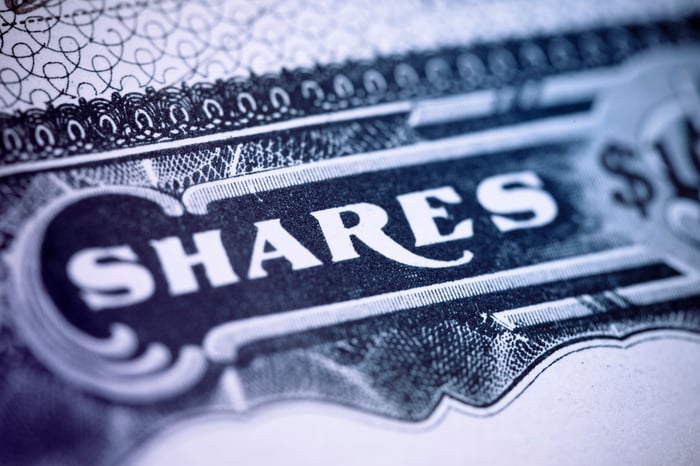The benchmark S&P 500 (^GSPC 0.12%) stock market index has delivered a gain of 67,036% (including dividends) since it was established in 1957. That translates to an average annual return of 10.2%, compounded.
That's more than twice the return investors could earn if they held cash right now, even with interest rates at a 15-year high.
But, historically, investors who purchased specific individual stocks have far outperformed the return of the S&P 500. I'm going to share 10 stocks that have crushed the index since their initial public offering (IPO), and they have the potential to help you beat the market going forward, too.

Image source: Getty Images.
1. Meta Platforms: 826% return since IPO
Meta Platforms (META -0.28%) is the parent company of popular social networks Facebook, Instagram, and WhatsApp. Its stock came public in 2012, and it has since gained 826%, which translates to a compound annual return of 22.4%. That's twice the long-run average of the S&P 500.
But it hasn't always been smooth sailing. Meta stock fell 76% from peak to trough between 2021 and 2022 and then roared back to life with a 194% gain in 2023. In the third quarter of 2023 (ended Sept. 30), the company delivered a record amount of revenue, and its net income (profit) surged 163% year over year.
Meta stock is still cheap relative to the broader technology sector, and more market-beating returns might be ahead this year and beyond as the company ramps up its investments in the artificial intelligence (AI) space.
2. Palo Alto Networks: 1,920% return since IPO
The next market-beating stock is Palo Alto Networks (PANW 0.34%), a world-leading cybersecurity company that came public in 2012. Its stock has soared by 1,920% since then, or by a compound annual rate of 31.4%, and it spent much of 2023 making record highs.
Investors have rewarded the company's growing investments in futuristic AI-powered cybersecurity, which are already attracting significant amounts of revenue. Palo Alto's one-year-old Cortex XSIAM product is a security operations solution designed to reduce reliance on human-led, manual incident response with the help of AI. It has already amassed $1 billion in bookings, with one large organization using it to protect 300,000 computers and devices (endpoints).
Palo Alto is on track to deliver a record-high $8.2 billion in total revenue during the current fiscal year 2024 (ending July 31, 2024). Considering that the cost of cyberattacks continues to soar, investing in one of the largest cybersecurity providers in the world might be a great move for your money going forward.
3. Alphabet (Google): 6,311% return since IPO
Alphabet (GOOG 1.06%) (GOOGL 1.08%) is the parent company of Google, but it's also home to other famous tech subsidiaries like YouTube and self-driving vehicle developer Waymo. Google stock came public in 2004 (it changed its name to Alphabet in 2015), and it has since delivered a return of 6,311%. That's equivalent to a compound annual gain of 24.5%.
Advertising dollars generated from Google Search remain Alphabet's single largest source of revenue, but a notable contribution also comes from its cloud computing platform, Google Cloud. It's growing in importance because it's where the conglomerate monetizes many of its AI initiatives, from new data center chips to large language models that form the foundation of AI software applications.
Like Meta, Alphabet stock also trades at an attractive valuation compared to its big-tech peers, and that could pave the way for more upside going forward.
4. Netflix: 44,146% return since IPO
Next up is streaming giant Netflix (NFLX 1.73%). It came public in 2002, shortly after the dot-com tech bubble burst, and its stock has delivered a red-hot gain of 44,146% since then. That translates to an annual return of 33.7%, compounded.
Netflix has disrupted everything from video rental stores to cable television. Its streaming service has become the largest in the world, with 247 million paying members, and the company continues to grow its addressable market by offering cheaper subscription tiers and by expanding into new territories.
Netflix is the only stand-alone streaming provider generating a profit, which bodes well for its long-term staying power compared to its peers, many of which are slashing costs right now. That could lead to more market share for Netflix over time and more gains for its stock.

Image source: Netflix.
5. Apple: 181,080% return since IPO
Apple (AAPL 0.02%) recently became the world's first $3 trillion company, and its stock has been one of the best performers in the history of the market. It has delivered a gain of 181,080% since its IPO in 1980, or a compound annual return of 19%.
The iPhone smartphone has become the company's biggest value creator, leading to other billion-dollar hardware products like the Watch and AirPods. Apple also has a booming services segment led by the subscription-based Apple Music, Apple News, and Apple TV. But AI might be one of the biggest reasons to own the stock going forward.
The company's iPhone 15 Pro features an Apple-designed A17 Pro chip that can process AI workloads on-device. It's reportedly working on a large language model and AI chatbot, and the ability to run such applications on the smartphone (as opposed to in the cloud) could mark a new dawn in mobile computing and pave the way for new features. It's hard to go wrong owning this tried-and-true long-term performer.
6. Amazon: 193,553% return since IPO
It started out selling books online in 1994, but Amazon (AMZN 0.58%) has transformed into one of the most diversified technology companies in the world. It came public in 1997, and its stock has soared by 193,553% since. That's a compound annual return of 33.8%, tripling the long-run average annual return of the S&P 500.
E-commerce remains Amazon's largest source of revenue, but the company draws most of its profit from its cloud computing division, Amazon Web Services (AWS). AWS is spearheading the company's AI initiatives, from developing data center chips to helping businesses develop their own AI applications. Amazon even purchased a $4 billion stake in leading AI start-up Anthropic late last year.
But there's even more to this company. Its streaming service -- Prime -- is second only to Netflix in memberships, and its digital advertising business is one of the fastest-growing pieces of the entire company. Simply put, Amazon stock is a great way for investors to expose their portfolios to the digital economy, and it's trading at a very attractive valuation.

Image source: Amazon.
7. Nvidia: 196,288% return since IPO
Nvidia (NVDA -1.99%) was the star of 2023, logging a bigger gain than any other stock in the S&P 500. It has a history of spectacular growth; it came public in 1999, and since then, its stock has surged 196,288%. That translates to a 37.2% annual return, compounded.
Nvidia's business is currently driven by astronomical demand for its AI data center chips, specifically the H100 and upcoming H200. The world's largest data center operators have raced to give their business customers access to enough computing power to handle AI workloads so they can develop applications and integrate productivity-boosting AI into their workflows. Nvidia has a dominant market share in this area, and there are very few viable alternatives right now.
In the recent fiscal year 2024 third quarter (ended Oct. 29, 2023), Nvidia's data center revenue surged by a whopping 279% year over year, to $14.5 billion. The company's Q4 forecast suggests it will end the year with a record $58.8 billion in total revenue, and Wall Street predicts it could deliver $92.2 billion in fiscal 2025. In other words, there appears to be plenty of growth left in the tank.
8. Oracle: 221,826% return since IPO
Founded in 1977, Oracle (ORCL 1.10%) is one of America's oldest technology companies. It executed its IPO in 1986, and its stock has since recorded a gain of 221,826%, translating to a compound annual return of 23.1%.
Oracle started out developing database management software, but today it's a leading provider of cloud-based applications designed to boost productivity in dozens of industries. Investors are intently focused on the infrastructure segment of Oracle's cloud business because the company says its Nvidia GPU chip clusters can train AI models at twice the speed and for half the cost of other leading cloud providers.
Oracle has already signed up leading AI start-ups like Cohere and Elon Musk's xAI, and the company is now building 100 new data centers (on top of its existing 66) because it can't keep up with demand. Therefore, now could be a great time to buy Oracle stock ahead of what could be a growth surge in the coming years.

Image source: Getty Images.
9. Microsoft: 504,247% return since IPO
Microsoft (MSFT -0.18%) is nipping at Apple's heels for the title of world's most valuable company. It has a market cap of $2.7 trillion, so it isn't far away. However, Microsoft has delivered a much larger gain than Apple since its IPO in 1986 (it came public with a much smaller valuation). Microsoft stock has soared 504,247% to date, or by 25.9% compounded annually.
Microsoft still operates some of its flagship software products, like the Windows operating system and Word. But it also expanded into hardware (computers and devices), gaming, cloud computing, and AI. Last year, Microsoft invested $10 billion in leading AI start-up OpenAI, which developed the ChatGPT chatbot.
Microsoft has integrated OpenAI's latest GPT-4 models into its Azure cloud platform, Bing search engine, 365 document suite, and Edge internet browser, among other products. It's allowing the company to successfully monetize AI already, with 18,000 businesses signed up to its Azure OpenAI Service cloud segment and tens of thousands of organizations using its AI Copilot tool for 365 in the early access program.
Those AI integrations could drive the next leg of Microsoft's growth, and with its stock near an all-time high, investors certainly appear optimistic.
10. Berkshire Hathaway: 3,787,464% return since IPO
Finally, the stock on this list that has created the most value is Berkshire Hathaway (BRK.A 0.68%) (BRK.B 0.93%). It's an investment company led by none other than Warren Buffett, who steered it to a 3,787,464% increase in value between 1965 (when he took the helm) and 2022.
That is a compound annual return of 19.8%, and while it's a lesser yearly gain than some other stocks I've mentioned, Berkshire's ability to nearly double the performance of the S&P 500 on a consistent basis for 58 years shouldn't be overlooked.
Berkshire owns a $358 billion portfolio of publicly traded stocks and securities, with large positions in Apple, Bank of America, American Express, and Coca-Cola. It also wholly owns private companies like Dairy Queen, Duracell, and GEICO. Its diverse exposure to so many different industries has been the secret sauce to its consistent returns over such a long period of time.
If you're looking for a stock with a solid track record of crushing the S&P 500, then look no further.





